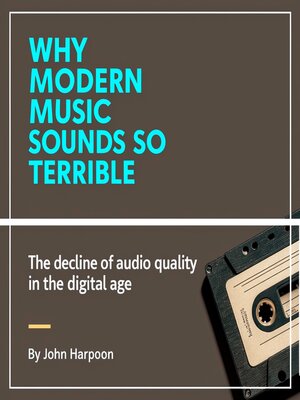Why Modern Music Sounds So Terrible
audiobook (Unabridged) ∣ The Decline of Audio Quality in the Digital Age
By John Harpoon

Sign up to save your library
With an OverDrive account, you can save your favorite libraries for at-a-glance information about availability. Find out more about OverDrive accounts.
Find this title in Libby, the library reading app by OverDrive.



Search for a digital library with this title
Title found at these libraries:
| Library Name | Distance |
|---|---|
| Loading... |
The way we experience music has changed dramatically over the past century. From the rich, warm tones of analog recordings to the compressed and often lifeless sound of digital streaming, audio quality has taken a significant hit. While technology has made music more accessible than ever, it has also introduced trade-offs that have diminished the overall listening experience. Many listeners may not even realize how much sound quality has suffered, as modern production techniques prioritize loudness and convenience over depth and detail.
One of the most significant shifts in music recording came with the transition from analog to digital. Vinyl records and magnetic tape once captured the full range of a performance, preserving the natural dynamics and imperfections that made music feel alive. However, as CDs, MP3s, and streaming services took over, music was compressed to fit digital formats, stripping away much of its warmth and depth. While digital audio offers clarity and convenience, it often sacrifices the organic richness that older formats provided. This shift set the stage for an industry-wide decline in sound quality, where efficiency and portability took precedence over artistic integrity.
Another major factor in this decline is the so-called "loudness war." Over the past few decades, record labels and producers have increasingly pushed for louder music to grab listeners' attention, especially in an era of short attention spans and endless competition. This practice involves compressing audio to its maximum volume, reducing the natural highs and lows that give music its emotional impact. The result is a flattened, fatiguing sound that lacks the depth and nuance found in older recordings. While louder tracks may stand out on first listen, they quickly become tiring and fail to leave a lasting impression.







